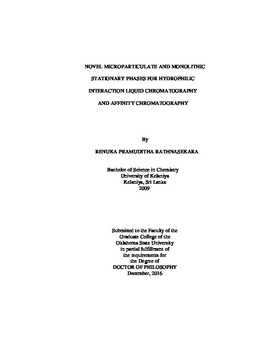| dc.contributor.advisor | El Rassi, Ziad | |
| dc.contributor.author | Rathnasekara, Renuka Pramuditha | |
| dc.date.accessioned | 2018-06-25T13:38:29Z | |
| dc.date.available | 2018-06-25T13:38:29Z | |
| dc.date.issued | 2016-12 | |
| dc.identifier.uri | https://hdl.handle.net/11244/300262 | |
| dc.description.abstract | The overall objective of this dissertation is to develop novel polar silica-based and monolithic-based stationary phases for the separation of a wide range of polar solutes by high performance liquid chromatography (HPLC) using the so-called hydrophilic interaction liquid chromatography (HILIC) separation mode. In addition, these polar stationary phases served as ideal polar matrices to immobilize various affinity ligands for use in high performance affinity chromatography for the purpose of separation and purification of various proteins under reduced nonspecific interactions. Firstly, two different types of amine based organic polymer monolithic stationary phases were synthesized via direct in situ polymerization and via post polymerization functionalization approaches. This was followed by the functionalization of silica microparticles with polar neutral, cationic and anionic moieties in order to develop singly and multilayered HILIC stationary phases. In all cases, the basic silica support was coated with an epoxy active layer via the reaction of silica with 3-glycidoxypropyl trimethoxysilane. Thereafter, the activated epoxy silica thus obtained was covered with either tris(hydroxymethyl)aminomethane (TRIS), maltose (MALT) or sorbitol (SOR) yielding the singly layered silica stationary phases. The TRIS-silica was further coated with a layer of chondroitin sulfate A (CSA) yielding the multilayered hydrophilic silica stationary phase referred to as CSA-TRIS-silica sorbent. An extensive chromatographic characterization was conducted to assess each of the developed HILIC stationary phases. Each of these stationary phase yielded unique retention pattern and selectivity towards various polar solutes tested. In addition, the polar MALT-silica stationary phase was further functionalized by converting it first to aldehyde-activated MALT-silica and the activated surface thus obtained served as the initial and starting hydrophilic support for immobilizing various antibodies, e.g., anti-human serum albumin and anti-transferrin, and lectin affinity ligands, e.g., concanavalin A. These affinity stationary phases were successfully used to deplete high abundance proteins as well as to enrich low abundance proteins in human serum under reduced nonspecific interactions. | |
| dc.format | application/pdf | |
| dc.language | en_US | |
| dc.rights | Copyright is held by the author who has granted the Oklahoma State University Library the non-exclusive right to share this material in its institutional repository. Contact Digital Library Services at lib-dls@okstate.edu or 405-744-9161 for the permission policy on the use, reproduction or distribution of this material. | |
| dc.title | Novel microparticulate and monolithic stationary phases for hydrophilic interaction liquid chromatography and affinity chromatography | |
| dc.contributor.committeeMember | Bunce, Richard A. | |
| dc.contributor.committeeMember | Materer, Nicholas | |
| dc.contributor.committeeMember | Krishnan, Sadagopan | |
| dc.contributor.committeeMember | Spicer, Leon J. | |
| osu.filename | Rathnasekara_okstate_0664D_14955.pdf | |
| osu.accesstype | Open Access | |
| dc.type.genre | Dissertation | |
| dc.type.material | Text | |
| thesis.degree.discipline | Chemistry | |
| thesis.degree.grantor | Oklahoma State University | |
